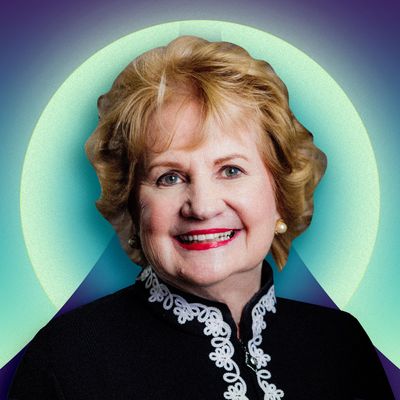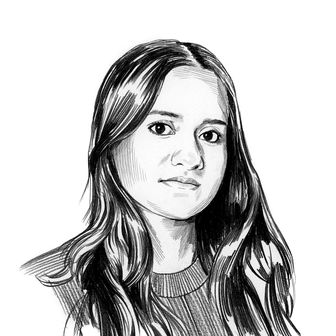
Twenty years ago, Virginia Jacko was working as a successful financial executive at Purdue University. Then she was diagnosed with retinitis pigmentosa, a rare genetic disorder that damages the light-sensitive tissue behind the eyes. There wasn’t a cure — Jacko’s prognosis was total blindness. Jacko’s daughter lived and taught in Miami at the time, and she told her about the Miami Lighthouse for the Blind and Visually Impaired, a nonprofit organization dedicated to providing resources, vision enhancement, job preparedness, and rehabilitation training to visually impaired individuals. Jacko went as a participant. Now she’s the organization’s president and CEO and helps other enrollees live confident, independent lives.
The Miami Lighthouse was the first private agency to adopt a model of integrated competitive employment, which allows people with disabilities to work a breadth of jobs and receive comparable pay to that of able employees. For 15 years, Jacko and her team have advocated for disability rights and provided education, training, and vision enhancement to local community members, from babies to seniors. Jacko has also advocated for disability rights on a national level. In 2019, the first Democratic debate for the 2020 election took place in Miami, and Jacko noticed that none of the candidates’ websites complied with the Americans with Disabilities Act. Virginia and her team prompted several candidates to make their websites accessible. Jacko also advised the Biden administration on creating an accessible and inclusive WhiteHouse.Gov.
Under Jacko’s leadership, the number of annual lighthouse enrollees has gone from under 500 to over 25,000. She’s launched initiatives for low-vision seniors and a pre-kindergarten program for visually impaired and blind children. Jacko, who is now totally blind, spoke to the Cut about her first job as a secretary, how the work she does is “never done,” and the importance of sharing pastelitos and café con leche with your staff.
When you were coming up, who did you look to as a mentor?
My mother. During World War II, women were pilots, nurses, and so much more. My mother was a dean of a nursing program at a college. I recall fondly when she’d play bridge and the neighborhood women introduced her as “the woman with five kids that works.” She was a very busy person, but you know that expression, “Give a project to a busy person, and they’ll definitely get it done”?
When did you feel like you’d “made it” professionally?
I don’t think there was an aha moment. The work’s never done.
Tell me about the last time you were told “no” in a professional setting.
I don’t really know the word no. Recently I spent months working on a proposal. The chairman of the board said our request wasn’t in line with his strategic plan. But I’d done my research, I knew literacy was important to this organization and that they were interested in helping low-income school children succeed academically. So were we. I persisted. I told the chairman that we’re enabling literacy for children with CVI. Now we have another phone call scheduled.
How about a professional failure you experienced in your career?
After college I worked for a large bank. I was told I could talk about my project at a meeting. There were about a dozen middle-aged white men in the room, dressed magnificently in tailored suits. My turn came, and I was speechless; I said, “pass.” What a huge opportunity I missed. I’ve since learned to not let intimidation affect me.
Do you feel a responsibility to hold the door open for others to follow you?
I sometimes ask myself, “Why aren’t there more blind people in the employment of major companies? What can I do — what’s helped me?” I was a successful executive in my sighted world. After I lost my eyesight, I went to rehabilitation training, where you learn professional skills without sight. It’s my responsibility to provide people with vision impairments with job training and find them opportunities at major corporations.
Is it isolating being the only visually impaired person in the room?
When you’re a totally blind executive, others may discount you. I remember an audit meeting from early on in my career. The gentlemen from the firm only spoke to the CFO. I thought, I’ll let this go on, but I’m going to ask them difficult questions, and then they’re going to realize they discounted that woman because she was blind, and she’s probably one of the smartest people in the room. Now my reputation stands for itself. I don’t feel discounted anymore. I want to bring focus to the pipeline of blind people ready to be employed. If people want to focus on, “Virginia’s visually impaired,” and the outcome is, “She’s doing a great job, let’s start hiring her people,” I’m okay with that.
How do you celebrate a win at work? Commiserate a loss?
Whenever I have great news, we celebrate with café con leche and pastelitos from a bakery in Little Havana. When it comes to a loss, I follow the strategy of my role models and tell everyone, “Let’s not worry. We’ll get it next year.”
Any advice for interviewing?
The key is to be prepared. Know your constituents. Someone shared a rule with me: For every hour of a meeting, spend three times as much time preparing.
What advice do you wish you’d had at the start of your career?
If you wing something, you can’t predict the outcome. But if you work toward the outcome you want, it leads to a higher probability of success.
And advice that proved terrible?
I once interviewed to be on a major board. One board member called me beforehand and said, “You don’t have to go to the meeting. They can interview you on the phone.” It probably had to do with me being blind, though I have an amazing guide dog and getting places is never a problem. I had a phone interview, and they didn’t pick me. I thought I was the most qualified person. Later, a board member told me: “Well, Virginia, you never showed up. Why did you request a phone interview?”
Let me guess: Was the first board member a man?
Yes.
This interview has been edited and condensed for length and clarity.
More From This Series
- Imagine If We Took Personal Ambition Out of Politics
- MC Lyte Wants You to Say ‘Yes’ More
- Reminder: Your Professional Achievements Don’t Define You





